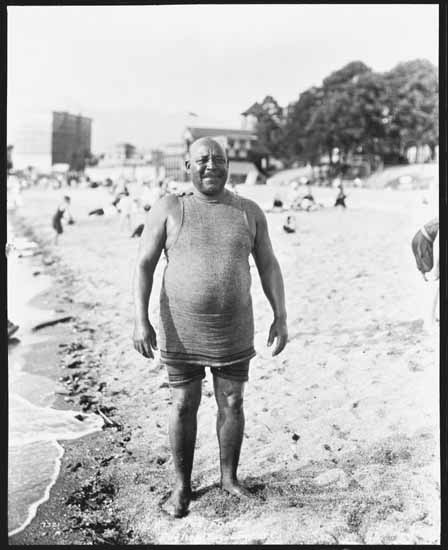
(1863 - 1922)
He boarded a brigantine, the Robert Kerr, loaded with sugar bound for Liverpool. Back then, these ships would go from one port to another carrying cargo, offloading it and taking another load to be delivered somewhere else. His travels took him to Rio de Janeiro, Buenos Aires, Panama, Amsterdam and eventually to the Pacific northwest. In one of his trips to Liverpool, Fortes took up swimming at one of the bathhouses - this is where Joe became confident of his strength and abilities. One would think that he would’ve been a strong swimmer coming from an island, but where Joe was from, beaches were not the sight that they are now: the beaches near where he grew up were full of sea urchins, stingrays and mud.
As fate would have it, the Robert Kerr ended up being shipwrecked in Granville, as it was known before it became Vancouver. On September 30, 1885, Joe was discharged from service on the ship, thus settling in Vancouver. Joe took on several odd jobs, one of which was at the Sunnyside Hotel at the juncture of Water and Carrall Streets. It was here that Joe would begin to gain a reputation for saving lives; during Vancouver’s Great Fire, two months after the city was incorporated in 1886, Joe went back into the hotel and saved the lives of prominent MP Arthur Ross’s wife and children. Joe continued to do all sorts of jobs, one which was a bartender and another giving rowboat rides. At the time, it was easier to row across the waters of False Creek and the Burrard Inlet than to travel the densely forested areas of Vancouver. After Fortes completed his tasks at hand, he spent the rest of the day exploring Vancouver’s shores. It was then (around 1887) that Fortes first encountered English Bay.
As Joe and others started to frequent the beach, he realized that there needed to be a better road/trail to get there. Joe took it upon himself to ask the mayor at the time, Malcolm McLean, who was related to Arthur Ross, to build a better road to the beach. As time passed, and more people began to flock to the beach, Fortes took on the beaches responsibilities for himself. He began guarding the beach, keeping peace and order on the shore as well as in the water. Joe taught the children how to swim, keeping an eye out for danger all around. He became so well known that people would expect him there and mothers would order their kids, “don’t go away from where Joe is!”
Joe was eventually given a salary and made special constable of the area during the summer season, thanks to the citizens of Vancouver who petitioned for him to be officially employed. During the off season, he was offered half-salary and was able to maintain his authority. There were times when certain Vancouver Parks Board commissioners questioned Fortes’ worth, and hassled him on whether he should be employed all year, but there were always many who had his back and supported him. Fortes proved his worth time and time again, having saved many lives and preventing near-drownings for scores more.
Fortes struck a close bond with the Scurry’s, one of Vancouver’s original pioneer families, after making friends with the family through the barber shop they owned. When her husband Hiram passed, Martha helped make ends meet by turning her home into a boarding house, providing shelter to many sailors arriving on the city’s shores. Joe resided there, but in his usual benevolent spirit, he also helped Martha keep order, as he knew that sailors could be a rough bunch.
In time, as his days were devoted to English Bay, Joe took up residence near his work, first in a tent, as many of the families did during the summer months. The City of Vancouver was constantly building to make way for progress, demolishing old structures along the way; Fortes saved a small cottage from demolition and claimed it as his own, convincing the City to transfer it to English Bay - 1708 Beach Avenue.
Vancouver’s population grew and the beach became busier and spread out. Joe got older and more tired, unable to keep up with the beach’s sprawl. His decline began in 1919 when he caught a bad cold, followed by another one after he saved a crew of fishermen from the wintery waters. It was probably those cold water rescues and cold environment in his cabin that led to rheumatism. By 1921, he needed a cane to walk, as the rheumatism went to his limbs. In early 1922 he caught the mumps, and his condition worsened to pneumonia. Vancouver’s Joe passed away on February 4, 1922. Mr. Fortes is credited with having taught three generations of swimmers and officially having saved 29 lives, although the actual number is closer to 100. The City of Vancouver afforded him a civic funeral, mainly reserved for high-ranking politicians or people of similar backgrounds - Joe was only the second exception that was made. The funeral procession had tens of thousands of onlookers, and the funeral service at Holy Rosary Cathedral (Joe was a devout Catholic) was full beyond capacity. The City gave him a funeral fit for a king, and rightly so as he was certainly the king of English Bay.
Joe received a medal in his younger years, presented by the Lord Mayor of Liverpool for his extraordinary swimming. During his life in Vancouver, aside from the recognition and celebrity that he enjoyed in the city, Joe received a medal “presented by the Vancouver Athletic Swimming Club to Joe Fortes for gallantry in saving life. July 1908.” In 1910, The City of Vancouver officially recognized Joe for his years of service by presenting him a gold watch on a chain, a bank draft for $472 and framed certificate which stated:
Mr. Joseph Fortes, swimming instructor and life saver. This writing, with the gold watch, chain and bank draft of $472, which accompany it, is intended to express the high appreciation in which your services are held by the citizens and children of Vancouver, B.C. You have risked your life to save those of others, and in the heroic prosecution of your duties at English Bay, you have prevented many drowning accidents. As a teacher of swimming, you have rendered invaluable aid to learners, while your politeness and good nature have endeared you to all with whom you have come into contact. Childhood has been safe in your hands, you have the good opinion of all but the evildoer. We trust that you may long be permitted to exercise the duties which in the past you have so admirably performed.
After his passing, the Kiwanis Club of Vancouver raised funds and erected a memorial fountain dedicated to Joe. It was sculpted by Italian Charles Marega, with a bronze relief of Joe smiling and three children playing. The back had the following inscription, “this fountain erected by the citizens and children co-operating with the Kiwanis Club of Vancouver commemorates the life and deeds of Joe Fortes for many years guardian of this beach. Little children loved him. A.D. 1927.” The fountain was unveiled at Alexandra Park, where it still stands today. In 1998, the next generation of Kiwanis fully restored the fountain and added a brick plaza and lighting for the fountain. The Vancouver Public Library named their Denman Street branch after him in 1976. In 1986, the Vancouver Historical Society formally declared Joe “Vancouver Citizen of the Century.” In September 2005, where the simply grave marker “JOE” existed, Tom Crean, owner of Kearney Funeral Services, funded a new grave marker for Joe where he is buried at Mountain View Cemetery. The new marker was carved of blue granite and featured his full name, Seraphim “Joe” Fortes, in between an image of a lifeguard’s chair and a crucifix.

